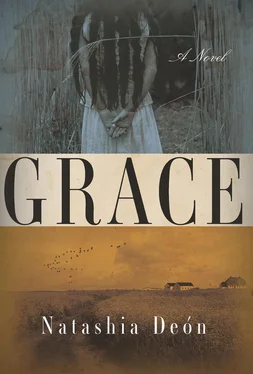Charles and Josey would walk along her creek — Stone Creek — far enough away from cotton fields and mills, hands carrying whips. They could dream of a future here, even though people say negroes are dreamless.
Stone Creek was just a man’s skip wide but Josey couldn’t make it across without Charles’s carry. She was five years old the first time she saw the past there — red beads and pottery. Tallassee would let the past seep in that way, through overflowed waters from the fast and wide Tallapoosa River, scooping buried things and rearranging ’em. Resurrected. Drag marks of black sand and brown mud led to where old things ended up — the storms’ treasure turning over lame in the swampy banks. Charles would lower Josey over the water so she could reach down and pick ’em up, the back of her dress knotted in his fist.
“Creek Indians,” Charles told her. “Chased out.”
Josey wondered why they’d gone and left such pretty things. And before she could ask the question, Charles would answer. “The Creek Indians lived here before the Spanish,” he told her. And he told her how the French came, then the English, then the English again, the second time with a dream to build a new nation.
Men rode the Tallapoosa River almost three hundred miles from Georgia to Alabama. Then just above Tallassee, thirty miles upriver, they built a dam in Montgomery. They came for the water’s strength — the waterfalls. They could power a mill with ’em, wet a town. They carved up Tallassee like cuts of meat. Sold her with the promise that she was theirs.
The river splits her in two so the men named one side of her East, and the other West. But she still see herself as one. Be silly to cut a person in half and call ’em now two peoples, treat ’em different. But they did. On her east side, bluffs hold groves of magnolias and oak trees like a fistful of flowers, and plantation houses. The west holds the mills and the workers.
Tallassee didn’t say nothin when they split her up. Of course she didn’t. She’s a piece of land. A mute spirit. Any voice she may have had went when the last Indian tribes left. But you can feel her fury. Angry at how she was tricked over the years — slow and steady. If it was done to her quick, she might have noticed.
These settlers weren’t forceful, at first. They were charming-like. Whispering sweetness in her ear as they passed through. Coming back more and more regular. Mapping things. Told her they were drawing pretty pictures of her. It’s how they do. Capture things on paper. Would catch the spirit, if they could. Would capture music, if they could. But some things you just got to be there to see. It’s why I thank God for making the spirit like running water. Even captured water will steam away. It’s what the Creek Indians believed Tallassee was — a spirit, uncatchable ’til she was caught.
Maps is how they did it. They separated East and West Tallassee on their papers, marking squiggly lines that meant “Tallapoosa River.” And on the paper, two waterfalls — the power that would turn the water wheel and give life to the mill. A mill that first made cotton cloth. A mill that would last make bullets. Even the gray bedrock that the river tumbled over was drawn in, unmoving. Proof you can’t capture everything. ’Cause in real life, the waterfalls splash on the green moss blanketing rocks and spray red berries stuck on leaning branches. But that didn’t matter on paper. And what don’t matter, don’t survive. Nothing survives its usefulness to white folk.
The Creek Indians were driven away (they got Africans and poor whites instead) and the waterfalls were made mules, and the river’s rocks were used to build stone buildings. Only gravel remained in the water, mostly unbothered. That, and the animals they couldn’t catch.
“The past always got a way of coming back,” Charles told Josey, pointing at the beads in her hand. “And this land got a memory.” It’s why Charles thought the bridges went down over the Tallapoosa River regular.
Tallassee would always start that happening the same way. She’d send the morning gusts first, high above the ground, rushing it through the treetops that covered the whole five-mile forest like a God-made roof. Even when heavy rains came, hardly a drop got through.
The wind would rush like water above the town, uncatchable, bending trees south. The limbs would lean, layering a thick cover of roof over the world of folks and things underneath, not disturbed.
I once watched a dried orange leaf hang from a branch by a single thread of shimmery web. While it stormed above, the leaf played in the calm space below, spinning, unaware of the darkening skies, nudged only into rocking by a bluebird seeking shelter. By the noon hour, it had been plucked away, stolen like everything else not rooted in the earth, then shoved into the wind-made tunnel that burrowed a pocket through Tallassee.
“This is a day of reckoning,” a white man said, standing on the wet cliff above another fallen bridge. Another said, “You can’t contain this landscape. Can’t beat her back. These vines are relentless growing in.” But people must beat it back, and they do to live here. Those who been here long enough call Tallassee the green-skirted gypsy of the South. Full of illusions. She’d set clouds on her hilltops like floating pearls. Even on days when no weather would call for ’em and no storms were on their way, she’d put just one cloud above a cluster of three or four oaks, making it look like the nesting jaybirds were smoking.
Good weather.
“Fertile and stable ground,” visitors would say, while a torrent simmered beneath her trick of “perfect place to make a life and start a family.” The Creek Indians knew her better. A thousand years they respected her, the way Charles and Josey do.
Those men shouldn’t have cut her up. Shouldn’t have tried to own her. Define her. Not with their caught pictures, their maps. The Creek Indians wouldn’t do it until they were forced to. The Creek landmarks became borders. Their asking her permission to stay became demands. Their maps, their boundaries, meant the end of the Indians’ world. It’s always how white men came to own things: “If you can define it, you can own it,” they’d say. “If you can define it, it can be fought for, killed for. A woman, a slave, a cow, dirt, an idea.” And it is what happened. Thousands lost their lives. The Creek Nation fought the new United States of America. The unshapeable spirit had been shaped into Tallassee’s pretty picture. And the lines of her cheekbones became battle lines. And it wouldn’t be the last time. There’s a civil war coming.
“If you lucky,” Charles said, pulling a broken plate from the water, “when the past comes to greet you, all it want to say is, ‘I remember you,’ then smile from longing.”
6/ FLASH, Conyers, Georgia, 1846
THE LAST THING I remember is Hazel telling me, “Run!” And I ran with all my soul, I did.
Then walked some.
Rested beside a stream and drank water. Ate some stale bread Hazel gave me. And when the bread was gone the second day, I used Hazel’s fire poker to kill again. But I prayed over that coon. Prayed over it with my Bible, started a fire the way Hazel taught me to. Roasted it, ate it, slept ’til daylight and ran again. ’Til nightfall, I did. Three more days this way. Three more days with Hazel’s voice in my head telling me, don’t stop. “Go north,” she said. So I kept on, under the cover of rainwet leaves and gray clouds.
By nightfall on the fourth day, I found that North Star. But by then, I was too tired for it to matter. Had been climbing up and over and up and over, the backs of my arms were sore and my muscles were burnt to cinder.
Читать дальше












